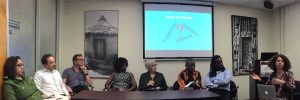SCAD Symposium: Revisiting Partnership for Development in Africa

On Monday September 25, the Social Change and Development in Africa Working group held the symposium, “Revisiting Partnership for Development in Africa.” The symposium consisted of three lectures from guest speakers and a panel discussion with four speakers from UF.
Jon Harald Sande Lie gave the first lecture titled, “Reproducing Aid Asymmetries Through Partnerships.” He is a senior research fellow at the Norwegian Institute of International Affairs (NUPI), with a PhD in social anthropology from the University of Bergen. His presentation analyzed the practice of partnership in development and aid through the World Bank—Uganda partnership. While the Ugandan government controlled policies relating to the project, the World Bank controlled what was financed. Jon Harald Sande Lie argues that this partnership is asymmetrical in that the donor has the advantage of placing blame on the state if aid fails but is also able to indirectly impact policy changes. Broadly, he argues that the concept of ‘partnership’ emerged as a way to alter inherent asymmetries in the aid relation between donor and recipient institution, seeking to turn top-heavy, donor driven approaches into more bottom-up and inclusive ones. Yet, after almost two decades where partnership has been the central organizing principle of aid, the power relation between donor and recipient institutions remains largely unaltered.
Next, Stephen Kosack presented, “Attempting Partnership: Donors, Researchers, CSOs, and Citizens in the Transparency for Development Project.” He is currently a faculty member at the University of Washington, and a nonresident Senior Research Fellow at the Harvard Kennedy School. His lecture focused on how partnership happens and what is means to “try to take it seriously”. He highlighted the role of transparency and participation in the outcomes of partnerships. He also discussed six design principles in partnership building: 1) co-design everything 2) focus on health, not health services 3) seek relevance for a range to local problems 4) let the communities drive 5) seek to empower, not prescribe and 6) keep outside resources to a minimum. He used multiple projects as case studies throughout the lecture, including the Transparency for Development Project, which has the goal to generate rigorous, comparative evidence on whether and how transparency and accountability programs can improve health.
Reehana Raza gave the final guest presentation, “Plurality of Voices in the Development Debate: Financing and Partnerships in the Think-tank and Research Community.” She is a senior research associate at the Center on International Development and Governance at the Urban Institute. Her lecture discussed think tanks in Africa, the expansion of think tanks, partnerships and financing relationships, and the future of funding for think tanks. Think tanks in Africa went through four periods where different groups provided funds: pre-independence funding was provided by the colonial nation state, then in the 60s and 70s universities and intellectuals, in the 70s and 80s foreign experts, and in the 90s and today civil society organizations provided funding. Funding sources are important in think tanks because often, the determine what they do through funding stipulations and lobbying. Dr. Raza emphasized the partnership—financing relationships in the Think Tank Initiative and the African Capacity Building Foundation in particular. Finally she stated that the number of funding sources for think tanks are declining and there must be a new approach to how we think of funding projects.
The UF panel included Sandra L. Russo (Director of the Office for Global Research Engagement, International Center), Agnes Leslie (Senior Lecturer and Outreach Director, Center for African Studies), Felicien Masanga (Graduate Student, Anthropology), and Mark Musumba (Research Associate, Institute for Sustainable Food Systems). Felicien Masanga presented, “Take it or lose it: the problem of power imbalance in the partnership between international NGOs and local organizations in Eastern DRC,” which discussed how partnerships have impacted Democratic Republic of Congo. Dr. Sandra Russo presented, “What does partnership mean when talking about gender,” which focused on the relationship between gender, aid, economics, and partnership. Dr. Agnes Leslie presented, “China-Africa partnership: How Africa can benefit from China’s agenda,” highlighting the partnerships and strategies China has employed across Africa, how some components of this relationship are problematic, and how Africa can benefit. Dr. Mark Musumba presented, “Reassessing the role of smallholder farmers in public-private partnership in Sub-Saharan Africa,” concentrating on how partnerships could increase risk for research participants when it comes to data ownership, consent, and the private sector. After giving short presentations on their own research or perspectives, UF speakers came together with guest speakers to discuss broader questions about partnership.